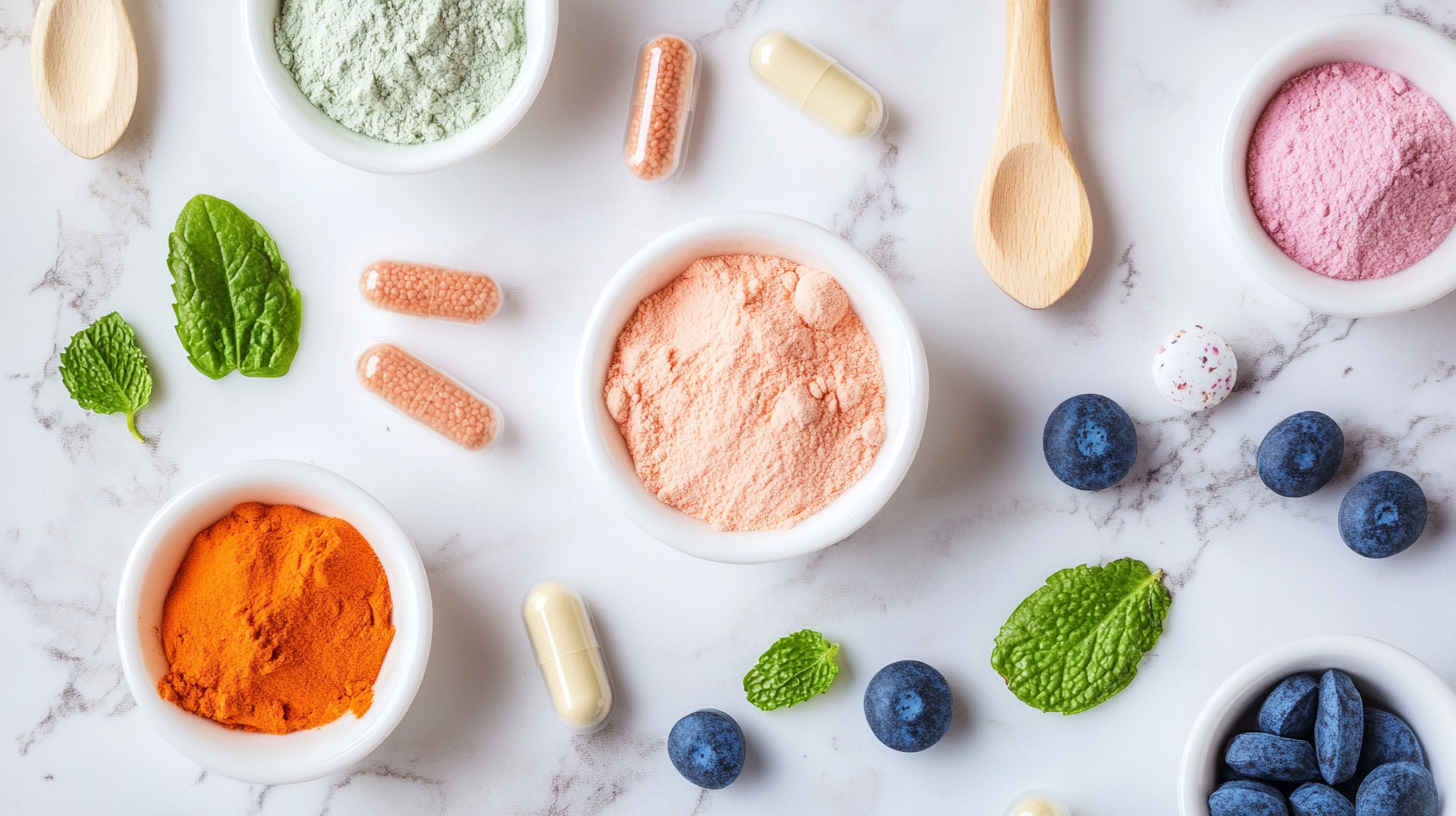Exclusive Offer: Limited Time - Inquire Now!
For inquiries about our products or pricelist, please leave your email to us and we will be in touch within 24 hours.
For inquiries about our products or pricelist, please leave your email to us and we will be in touch within 24 hours.
As the global demand for collagen food supplements continues to surge, projected to reach $6.63 billion by 2025 according to recent industry reports, consumers are increasingly discerning about their choices. This growing market is fueled by a heightened awareness of health and wellness, making it essential for individuals to understand how to select the right supplement that meets their specific needs.

In this context, China's ascent as a key player in the collagen supplement market, marked by an emphasis on quality and innovation, further amplifies the competitive landscape. As various forms of collagen—hydrolyzed, gelatin, and marine—emerge with distinct benefits, the challenge lies in navigating the plethora of options to find the most effective solutions.
This blog aims to provide insights into the best collagen food supplements available in 2025, ensuring you’re equipped with the knowledge to make an informed choice tailored to your lifestyle and health goals.
When it comes to collagen food supplements, understanding the different types is crucial for making an informed choice. Collagen is a protein that comes in various forms, with the most common being Types I, II, and III. Type I collagen is known for its strength and is primarily found in skin, bones, and tendons, making it ideal for skin health and anti-aging benefits. Type II is more prevalent in cartilage and is beneficial for joint health, often sought after by athletes and individuals with arthritis. Type III typically accompanies Type I and supports skin elasticity and blood vessel health.
When selecting a collagen supplement, it’s essential to consider your specific needs. For skin-related benefits, opt for a supplement high in Type I collagen. If joint support is your goal, choose one that emphasizes Type II collagen. Another tip is to look for hydrolyzed collagen, as it is easier for the body to absorb.
Check for additional ingredients like vitamin C, which can enhance collagen synthesis and promote overall efficacy. Always read the label thoroughly to ensure that you're making a choice aligned with your health objectives.
When it comes to selecting the best collagen food supplements, it's essential to understand the key ingredients that signify high quality. Look for hydrolyzed collagen peptides, as they are easily absorbed by the body and known for their effectiveness in promoting skin elasticity and joint health. Additionally, collagen sourced from grass-fed bovine or wild-caught fish often contains a better amino acid profile, further enhancing the supplement’s benefits.
When browsing supplements, consider those that include complementary ingredients like vitamin C, hyaluronic acid, and biotin. Vitamin C not only aids in collagen synthesis but also enhances skin brightness. Hyaluronic acid helps retain moisture, making it vital for skin hydration, while biotin contributes to overall hair, skin, and nail health.
One helpful tip is to check the sourcing and processing of the collagen. Brands that invest in transparency about where their collagen comes from and how it’s processed often provide products of superior quality. Also, look for certifications such as non-GMO or third-party testing to ensure you are investing in a supplement free from harmful additives.
When considering collagen food supplements, it is essential to evaluate their efficacy based on scientific studies. Research has shown that collagen can play a significant role in skin health, joint function, and muscle mass maintenance. For instance, a study published in the Journal of Medical Nutrition & Nutraceuticals found that daily collagen peptide supplementation improved skin elasticity and hydration in older women. Furthermore, another study highlighted its benefits in reducing joint pain and improving mobility in athletes. These findings suggest that collagen supplements could be a valuable addition to your wellness routine.

When choosing the right collagen supplement for you, consider these tips:
By applying these guidelines and staying informed about the latest research, you can make an informed decision that suits your health goals and lifestyle.
 Understanding the labels on collagen food supplements is crucial for making informed decisions. According to recent market research, the global collagen market is projected to reach $6.63 billion by 2025, driven by increasing consumer awareness about the benefits of collagen for skin, joint health, and overall wellness.
To truly benefit from these products, one must navigate the often-confusing supplement facts on their labels.
Understanding the labels on collagen food supplements is crucial for making informed decisions. According to recent market research, the global collagen market is projected to reach $6.63 billion by 2025, driven by increasing consumer awareness about the benefits of collagen for skin, joint health, and overall wellness.
To truly benefit from these products, one must navigate the often-confusing supplement facts on their labels.
When interpreting the supplement facts for collagen products, pay attention to the types of collagen being offered. The most common types in supplements are Type I and Type III, which primarily support skin and hair health. A 2022 study found that daily intake of 2.5 to 15 grams of collagen peptides significantly improved skin elasticity and hydration. Additionally, be aware of the source of the collagen—marine, bovine, or porcine—as this can impact bioavailability and your dietary preferences.
Tips: Always check for third-party testing to ensure the potency and purity of the collagen supplement. Look for products that specify hydrolyzed collagen, which is broken down into smaller peptides for better absorption. Lastly, consider additional ingredients like Vitamin C, which can enhance collagen synthesis in the body, making the supplement even more effective.
When selecting collagen food supplements, brand reputation and supplier transparency are crucial factors to consider. According to a 2023 report from the Global Collagen Market, which projected a compound annual growth rate (CAGR) of 6.8% during the next five years, consumers are increasingly prioritizing the credibility of brands. Companies that provide clear sourcing information and ingredient transparency are more likely to gain consumer trust and loyalty. This transparency allows consumers to make informed decisions, ensuring they are investing in high-quality supplements.
Tip: Always look for brands that disclose their ingredient sourcing and testing procedures. Third-party certifications can also enhance credibility, ensuring that the product meets health and safety standards.
Additionally, supplier transparency can provide insights into the sustainability practices of a brand. Research from the Nutrition Journal indicates that 72% of consumers prefer brands committed to environmentally friendly practices. This trend emphasizes the importance of choosing collagen supplements that not only offer health benefits but also align with ethical values.
Tip: Research the brand’s commitment to sustainability. Look for claims regarding ethical sourcing, eco-friendly packaging, and whether the collagen is derived from grass-fed, wild-caught, or sustainably-farmed sources.
| Product Type | Source of Collagen | Form | Key Ingredients | Brand Transparency Rating | Customer Reviews |
|---|---|---|---|---|---|
| Hydrolyzed Collagen | Bovine | Powder | Vitamin C, Hyaluronic Acid | 4.5/5 | Positive |
| Marine Collagen | Fish | Liquid | Vitamin E, Biotin | 4.7/5 | Very Positive |
| Collagen Gummies | Bovine | Gummy | Zinc, Biotin | 4.2/5 | Mixed |
| Collagen Capsules | Bovine | Capsule | Vitamin A, Coenzyme Q10 | 4.3/5 | Positive |
| Vegan Collagen Booster | Plant-based | Powder | Pea Protein, Silica | 4.6/5 | Positive |
